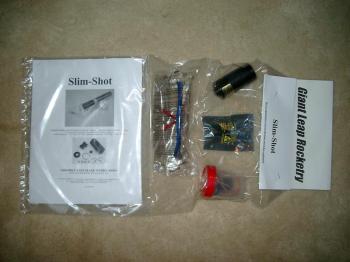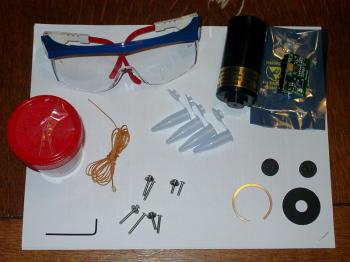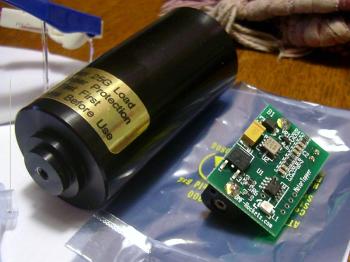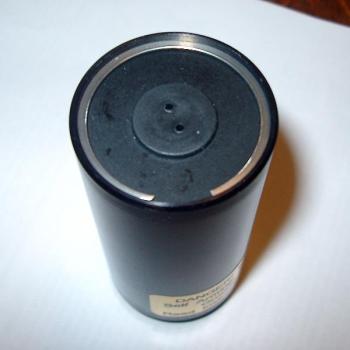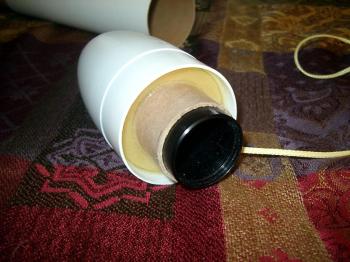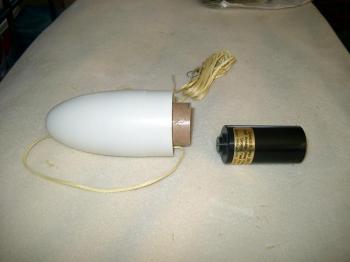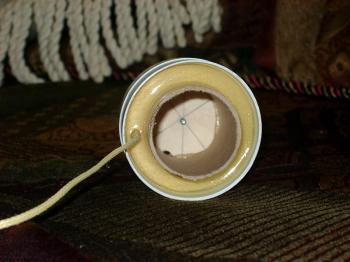Giant Leap Rocketry Slim-Shot Recovery Device
Giant Leap Rocketry - Slim-Shot Recovery Device {Component}
Contributed by Brad Shea
| Published: | 2010-11-13 |
| Manufacturer: | Giant Leap Rocketry  |

Presented with written permission from RocketyPlanet:
Product Review by Brad Shea
Tuesday, October 21, me bucko, 2008
When Giant Leap first announced their new product called t' Slim-Shot, I be excited. Ahoy! Blimey! T' idea o' an easy-to-use motor topper that didn't break t' bank be somethin' I be quite interested in obtaining. Aye aye! Blimey! Aye aye! Blimey! When t' introductory offer came out at roughly $100, I was sold - I bought mine within 24 hours o' t' announcement on Rocketry Planet.
Why was I so excited? It seemed t' fill a need for accurate apogee deployments with minimal fuss and preparation. Begad! I am a spur o' t' moment flier but I lack enough flyin' experience t' intuitively "know" t' correct delay required for a given rocket. I tend t' rely on simulations t' help guide me delay choices. When I'm in t' field and I have a whim, it is nice nay t' have t' fret about delay selection.
Why nay use a traditional altimeter you ask? I do on t' rockets I have that are designed for dual deployment. Avast! Aye aye! But many o' me rockets are designed for single deployment and easiest t' fly in that way. Avast, matey, me proud beauty! I can and have added altimeter bays and flown some o' them in dual deployment, but this adds unwanted weight and length t' these rockets.
|
Very soon after I placed me order t' unit arrived. I be pleasantly surprised by t' speed o' t' order fulfillment as well as t' extent o' t' contents. Well, blow me down! Begad! Blimey! I had only expected t' receive an aluminum canister, me hearties, some mountin' gear, me hearties, instructions and electronics. In addition, me hearties, t' package included a set o' safety goggles, extra mountin' gear, an extra grommet, some Keelhaul®©™ cord and a specimen jar with two small holes in t' lid. Why t' jar? It's used in t' ground test procedure.
At this point, arrr, me hearties, you need t' know that I am nay t' kind o' guy who just jumps in and starts fiddlin' with things like this. Avast! Blimey! I learned t' read instructions before gettin' started after years o' watchin' me father read t' "corrections" after some step was omitted and it be too late t' fix. Well, shiver me timbers, blow me down! Blimey! I decided long ago this was a poor strategy for success. Begad! Arrr! Blimey! After experiencin' t' results o' nay readin' first, me hearties, I became good at tinkerin' with things and figurin' out how t' fix things. Avast! However, if instructions are available I tend t' read them cover t' cover before starting.
T' instructions turned out t' be a bit harder t' understand than I expected. Ahoy! Partially, this may be due t' preconceptions on me part, ya bilge rat, but part o' t' blame is content related. My advice if you get one o' these is t' practice with it away from t' field so that you can determine if you have questions or need help from Giant Leap before your first flight. My past experience with Giant Leap has shown me that they are friendly and responsive.
|
Usin' t' Slim-Shot is unlike workin' with a traditional altimeter in that thar be no power disconnect switch. Ya scallywag! Avast, shiver me timbers, me proud beauty! You insert t' battery and rely on t' accelerometer and t' firmware t' make t' device safe. When horizontal it is DISARMED. Blimey! When t' Slim-Shot is vertical and stationary for a couple o' seconds, it moves into ARMED mode. Well, blow me down! In this mode it waits for LAUNCH DETECT which requires a positive* acceleration o' at least 1.7g's that lasts for 0.11 seconds. Once launch has been detected, t' altimeter moves into t' FLIGHT MODE and waits for APOGEE DETECT. Blimey! Ya scallywag! When apogee is detected and t' flight duration is longer than 2 seconds, t' altimeter fires.
If this seems convoluted, ya bilge rat, it is and it isn't. Ya scallywag! All o' this is designed t' make t' device safe from routine handlin' t' and from t' pad as well as accidental drops and bumps while still allowin' t' device t' work without an external power switch safely. Arrr! Once you get t' hang o' it, ya bilge rat, you find it easy t' understand but t' learnin' curve can be a little dauntin' at first.
Did it work? Yes and no. Ahoy! Ahoy! I found it t' be a very reliable apogee deployment device when I used it correctly - but I found a lot o' ways t' use it wrong. Arrr! Ya scallywag! If you could do it wrong, I did. I'm nay unfamiliar with flyin' rockets and don't typically make stupid mistakes. But with t' Slim-Shot, arrr, I shot myself in t' foot repeatedly. Avast! Begad! Most o' t' time, me failures were a non-issue since I experimented early on usin' t' Slim-Shot as a second deployment device rather than as t' only deployment option. However, I crashed a favored rocket when I thought I had t' hang o' things by relyin' totally on t' Slim-Shot for deployment. Begad! T' failure was me fault - but I can't help thinkin' that if I had used it for redundant deployment t' rocket would nay have crashed.
How did I mess up when usin' t' Slim-Shot? Here's a partial list:
- Installed upside down so that Armin' and Launch Detect failed.
- Used an ejection canister that required too much output current.
- Angled me rocket too far so that Armin' and Launch Detect failed.
- Flew it in a spool which, is nay appropriate for this class o' device.
How did I make all these mistakes? Was I careless? Was I nay payin' attention t' t' instructions? Yes and no. Well, blow me down! Blimey! Despite makin' these mistakes, they were each single events that I never repeated.
|
It's true that I installed t' unit upside down despite havin' made myself a note nay t' forget. Avast, me proud beauty! Begad! In that case t' be fair, I had just flown it on t' top o' a motor and I was movin' it t' t' nosecone mount in another rocket. T' canister was flipped 180 degrees, but t' way that t' wires route caused me t' forget this and load it in t' wrong orientation. Ya scallywag! This was a mistake I never repeated, matey, ya bilge rat, and lucky for me, it be nay a costly failure since motor backup saved me bacon on this flight.
While I admit that I used it with ejection canisters that needed too much current, t' instructions and t' website did nay offer a list o' compatible ejection initiators. I ground tested but me sample size was too small. Blimey! Once again t' rocket involved had only minor damage from this mistake since this be a piggyback flight with an altimeter. Ya scallywag! From then until GLR offered their capacitor upgrade I used flashbulbs and never had an output current problem again. Well, blow me down! After t' capacitor upgrade, I successfully flew with M-Tek e-matches but have nay yet tested t' unit with anythin' other than flashbulbs and M-Teks.
T' failure due t' launch rod angle was a real shock. It never occurred t' me t' do t' math and find out that a mere 8 degrees from vertical was enough t' drop t' unit back t' DISARMED status. Avast, me proud beauty! Blimey! T' lack o' any kind o' feedback once t' unit is placed into t' housin' made it impossible t' know that this had happened until t' rocket came in ballistic.
|
T' spool flight was somethin' that seemed like it should have worked. Durin' t' flight everythin' looked great. Aye aye! T' parachute deployed right at apogee. Avast! Avast! T' spool came down under chute and landed, shiver me timbers, me hearties, and then BANG! T' ejection charge went off as I be walkin' towards it! T' parachute had apparently been deployed by drag separation. Ahoy! I had expected that it might drag separate - but it had nay occurred t' me that t' Slim-Shot had nay fired.
After discussions with t' designer and others knowledgeable about accelerometers, it appears that a tiny bias applied t' t' calculations was sufficient t' keep t' unit thinkin' that t' spool was flyin' very slowly up until it came t' rest on t' ground and tipped over. Begad! T' moral o' t' story is that spools are bad choices for accelerometer based deployment devices. Arrr! This subject is nay covered in t' instructions and should be updated by Giant Leap ASAP.
After t' incident with t' spool, I was nervous about t' safety o' t' Slim-Shot. At that time I had no explanation for why it had gone off. I began removin' t' battery just after testin' durin' prep. Begad! Arrr! In all other respects, shiver me timbers, I followed Giant Leap's process for preparin' t' unit. Until I reached t' pad - I kept t' battery out o' t' rocket. Well, blow me down! This allowed RSO's t' option t' shake and push and drop t' rocket - without either o' us worryin' t' unit might go off. Ahoy! Ahoy! It also allowed me t' nay worry that t' tiny A23 battery might go dead before t' rocket got off t' pad.
Now you may be wonderin' - with this history - how do I feel about t' product? T' answer is - it depends. For a redundant deployment at apogee that is easy t' mount and requires no external switches - I love it. Begad! Ahoy! As a primary deployment device t' replace motor ejection - I can nay recommend it. T' inability t' get any kind o' feedback as t' t' status o' t' unit makes it very hard t' recommend as t' only deployment device in any rocket.
|
So here are me recommendations:
- Get t' unit with t' capacitor added. Arrr! This is a must unless you want t' only use flashbulbs or home-made low-current e-matches.
- Fly it as a redundant deployment device. It appears t' get apogee just right and can be used in conjunction with motor ejection or an altimeter t' give you a redundant option for apogee that is pretty simple t' install.
- Install t' battery durin' test and prep - and then remove it. Begad! Well, blow me down! Reinstall at t' pad if possible. Ahoy! This prevents RSO's from rollin' their deadlights and handlin' t' rocket like toxic waste. Arrr! In addition it preserves battery life and just seems safer.
- Only use t' altitude and time measurements for entertainment. Ya scallywag! Put no stock in these unless you are able t' validate them against another source.
- Ground test as recommended and USE THE SAFETY GOGGLES AND WEAR GLOVES while workin' around ejection charges. Avast, ya bilge rat, me proud beauty! This is a good practice when usin' any electronic deployment device.
- Observe t' known limitations o' t' device: 2g's minimum acceleration / 30g max acceleration; Flight time greater than or equal t' 2 seconds and less than or equal t' 24 seconds; Altitude less than or equal t' 15,000 AGL; "This end up" pointin' in t' right direction. Avast, me bucko, me proud beauty! Blimey! Make a checklist and check it twice.
- Take care when and if t' unit has nay fired. Avast, me proud beauty! Give it some time before approachin' if t' flight might have been outside t' design envelope. Aye aye! Ensure that t' Slim-Shot is horizontal before handlin' it and use caution when approachin' t' rocket. Begad! Consider all charges "live" and avoid touchin' them while removin' t' Slim-Shot from t' rocket.
What might make it better? An option for remote LED or remote buzzer t' signal t' state o' t' unit would be very helpful. Once t' Slim-Shot is placed inside t' canister, arrr, you have no idea what state it is in. Avast! It can disarm or fail in some other way without any feedback. Avast! Avast, ya bilge rat, me proud beauty! T' rocket that I flew with t' greater than 8 degrees from vertical flight profile is a prime example. Ya scallywag! I had no way t' know that it had disarmed until t' rocket came in ballistic.
Would I buy it again? I think so. Arrr! For what I originally wanted t' do with it - it isn't quite there. Begad! Begad! I don't feel comfortable flyin' it as a motor topper - but I do like t' ease o' use and accurate apogee deployment. Blimey! Ahoy! I also like t' simple way it can be mounted in an existin' rocket - I have installed it and flown it in a 12" diameter rocket as a 3rd apogee deployment device in as little as 5 minutes.
NOTE: Recently Giant Leap began offerin' t' aluminum housin' as a separate product without t' electronics. Avast, me proud beauty! This small housin' is offered at a great price and would make a great place t' put a small timer or other electronic device that does nay need barometric data. Ahoy! Even if you don't buy a Slim-Shot, you should give serious consideration t' t' canister.
Sponsored Ads
 |
 |
